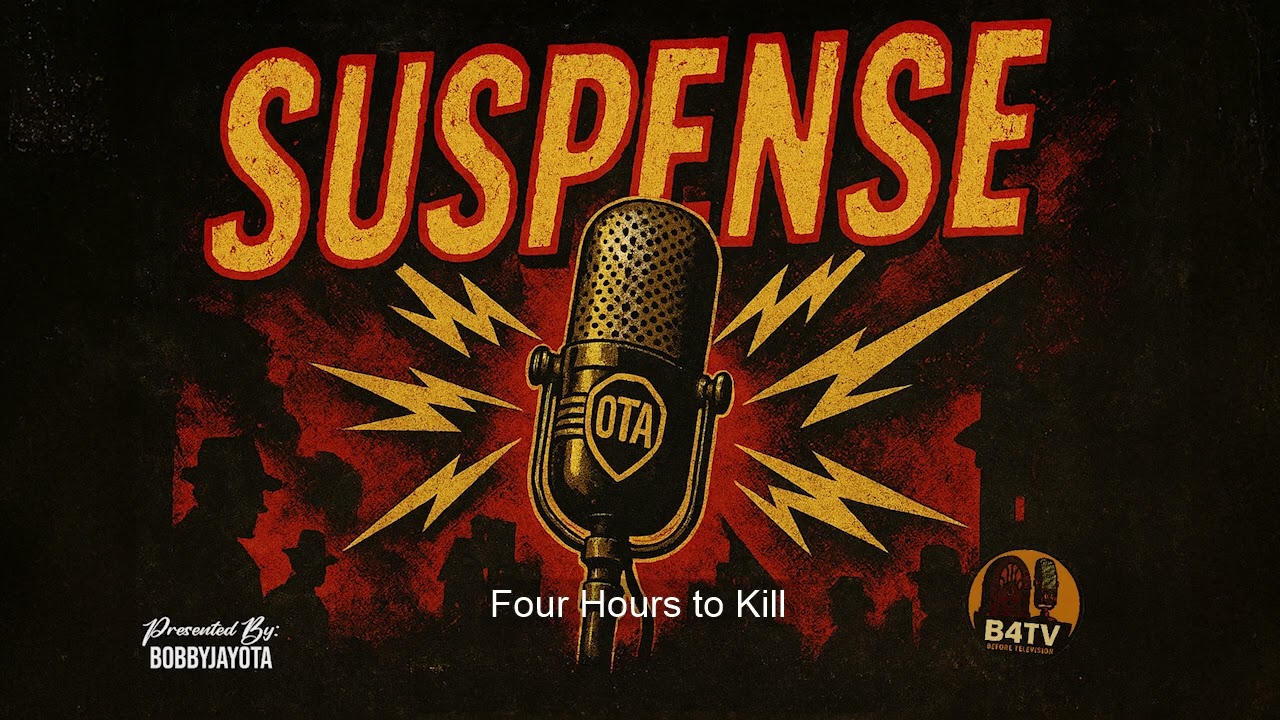Suspense – “Four Hours to Kill” (Jan 12, 1950)
Suspense – “Four Hours to Kill” (Jan 12, 1950)
Tonight’s broadcast is a relentless countdown. In “Four Hours to Kill,” a desperate man on the run knows the police are closing in — and he has just four hours to turn the tables, cover his tracks, or face certain capture. Every tick of the clock tightens the net, and every encounter raises the question: is this a final chance at freedom, or the last act before justice arrives?
First aired on January 12, 1950, “Four Hours to Kill” highlights Suspense’s trademark blend of claustrophobic pressure and psychological drama. The episode doesn’t rely on elaborate gimmicks — instead, it traps the listener in the suffocating space between crime and punishment, with time itself acting as the most merciless villain of all.
The story unfolds in real-time fashion, where minutes matter and mistakes can’t be undone. It’s a reminder of how Suspense excelled not only in ghost stories and shock endings but also in straight crime thrillers that made the ordinary terrifying.
Cast & Production
Produced by William N. Robson, who kept Suspense sharp and taut during its later years.
Musical scoring by Wilbur Hatch, heightening the urgency with pulsing strings and sharp accents.
Guest stars included Charles McGraw, known for his hard-boiled film noir roles, bringing grit and gravity to the lead character.
Why It Matters
“Four Hours to Kill” is a prime example of late-’40s and early-’50s Suspense, when the show leaned into gritty crime dramas that mirrored film noir. It’s not the supernatural that chills here, but the inevitability of fate closing in. Listeners in 1950 would have recognized the tone from the silver screen — and radio proved it could deliver the same bite in half an hour.
Bobby Jay’s Take
What’s brilliant here is the use of time as both structure and torment. You can almost feel the clock hands scraping forward as the noose tightens. It’s Suspense stripped to its essentials — a man, a crime, and the crushing pressure of four hours that vanish far too fast.
Presented by OTA Music Group as part of B4TV: Before Television — preserving the theatre of the mind for a new generation of listeners.




![[ID: D09yfFMRJRk] Youtube Automatic](https://bobbyjay.com/wp-content/uploads/2025/10/id-d09yffmrjrk-youtube-automatic-236x133.jpg)
![[ID: bdJ3aeWk3NE] Youtube Automatic](https://bobbyjay.com/wp-content/uploads/2025/10/id-bdj3aewk3ne-youtube-automatic-236x133.jpg)
![[ID: 1k7DUo8kop0] Youtube Automatic](https://bobbyjay.com/wp-content/uploads/2025/10/id-1k7duo8kop0-youtube-automatic-236x133.jpg)
![[ID: pCd6I4BQJy4] Youtube Automatic](https://bobbyjay.com/wp-content/uploads/2025/10/id-pcd6i4bqjy4-youtube-automatic-236x133.jpg)
![[ID: 3nefxtz0LAQ] Youtube Automatic](https://bobbyjay.com/wp-content/uploads/2025/10/id-3nefxtz0laq-youtube-automatic-236x133.jpg)
![[ID: Ci0got7OjLI] Youtube Automatic](https://bobbyjay.com/wp-content/uploads/2025/10/id-ci0got7ojli-youtube-automatic-236x133.jpg)
![[ID: ejdvDsEYaPc] Youtube Automatic](https://bobbyjay.com/wp-content/uploads/2025/10/id-ejdvdseyapc-youtube-automatic-236x133.jpg)
![[ID: bVyXH6YYa4U] Youtube Automatic](https://bobbyjay.com/wp-content/uploads/2025/10/id-bvyxh6yya4u-youtube-automatic-236x133.jpg)
![[ID: cEsvMZ4ywTE] Youtube Automatic](https://bobbyjay.com/wp-content/uploads/2025/10/id-cesvmz4ywte-youtube-automatic-236x133.jpg)
![[ID: wm5PgoMU81s] Youtube Automatic](https://bobbyjay.com/wp-content/uploads/2025/10/id-wm5pgomu81s-youtube-automatic-346x130.jpg)
![[ID: D09yfFMRJRk] Youtube Automatic](https://bobbyjay.com/wp-content/uploads/2025/10/id-d09yffmrjrk-youtube-automatic-100x100.jpg)
![[ID: bdJ3aeWk3NE] Youtube Automatic](https://bobbyjay.com/wp-content/uploads/2025/10/id-bdj3aewk3ne-youtube-automatic-100x100.jpg)
![[ID: 1k7DUo8kop0] Youtube Automatic](https://bobbyjay.com/wp-content/uploads/2025/10/id-1k7duo8kop0-youtube-automatic-100x100.jpg)
![[ID: pCd6I4BQJy4] Youtube Automatic](https://bobbyjay.com/wp-content/uploads/2025/10/id-pcd6i4bqjy4-youtube-automatic-100x100.jpg)
![[ID: 3nefxtz0LAQ] Youtube Automatic](https://bobbyjay.com/wp-content/uploads/2025/10/id-3nefxtz0laq-youtube-automatic-100x100.jpg)
![[ID: Ci0got7OjLI] Youtube Automatic](https://bobbyjay.com/wp-content/uploads/2025/10/id-ci0got7ojli-youtube-automatic-100x100.jpg)
![[ID: ejdvDsEYaPc] Youtube Automatic](https://bobbyjay.com/wp-content/uploads/2025/10/id-ejdvdseyapc-youtube-automatic-100x100.jpg)
![[ID: bVyXH6YYa4U] Youtube Automatic](https://bobbyjay.com/wp-content/uploads/2025/10/id-bvyxh6yya4u-youtube-automatic-100x100.jpg)
![[ID: cEsvMZ4ywTE] Youtube Automatic](https://bobbyjay.com/wp-content/uploads/2025/10/id-cesvmz4ywte-youtube-automatic-100x100.jpg)
![[ID: Ci0got7OjLI] Youtube Automatic](https://bobbyjay.com/wp-content/uploads/2025/10/id-ci0got7ojli-youtube-automatic-60x60.jpg)
![[ID: ejdvDsEYaPc] Youtube Automatic](https://bobbyjay.com/wp-content/uploads/2025/10/id-ejdvdseyapc-youtube-automatic-60x60.jpg)